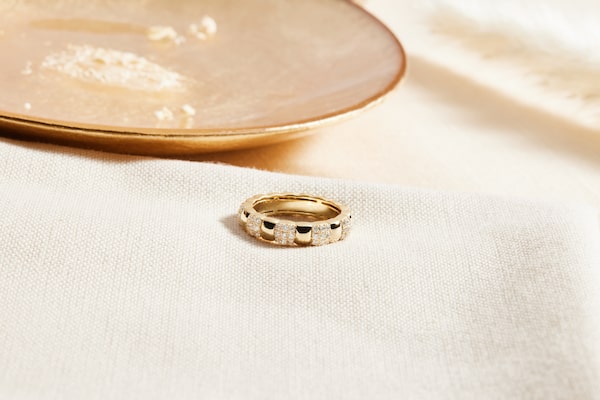Noura Sakkijha is a pioneer in more ways than one. As CEO of Toronto-based Mejuri, she revolutionized the fusty world of fine jewellery by using the brand’s e-commerce platform to sell more affordable pieces to a younger clientele. She emphasized the importance of self-gifting, characterizing purchasing rings and necklaces and earrings for oneself as a feminist act. Now, she’s turning her attention toward the most pressing issue that the fine jewellery industry has faced: making the baubles we buy as sustainable as possible.

Mejuri CEO Noura Sakkijha is pictured at her Toronto home. She wears a selection of the jewellery brand’s necklaces including (from top) its Rivière choker, engraveable tag and Winged Coin Pendant.McKenzie James/The Globe and Mail
Jewellery inhabits a rare grey area when it comes to sustainability. While mining precious metals and stones has an unquestionable adverse impact on the environment, the finished product is not disposable in the same way as an impulse buy from Zara. Jewellery tends to be treasured and passed down from generation to generation as an heirloom. And because the material it is made from has inherent value, it tends to be recycled.
Style Advisor November 2021 edition: Stylish inspiration for your holiday gift giving
Many jewellery brands have started to make commitments to improve on these green credentials. Danish customizable charm bracelet-maker Pandora has pledged to only use recycled gold and silver in its products by 2025. Luxury brands such as Swiss house Chopard have not only committed to buying responsibly sourced gold, but promised to credit the sources of their materials in exacting detail.
Mejuri wants to be at the forefront of these changes. Sakkijha and her team recently announced that by the end of this year, 70 per cent of their 14-carat solid gold products will be made with 70 per cent certified recycled gold (30 per cent will remain newly mined). All of the gold that Mejuri uses will be traceable, a process that involves suppliers disclosing where they’ve sourced materials and third-party auditing for mines and refineries. This season’s Baguette Bar Necklace set with conflict-free diamonds and a new series of stacker rings all interpret the brand’s sustainable ethos in its classic and minimal style.

Mejuri’s sustainable options include its Charlotte cushion ring (above) and pavé choker (below).Handout

Mejuri’s sustainable options include its pavé choker.Handout
“In the fine jewellery industry, there are a lot of handoffs from mine to manufacturer and it’s easy to lose track of how things have gone through the supply chain,” Sakkijha says. “Traceability was a way for us to start to ask questions about the journey of the product, so that we were able to understand any unintended impacts our products were having on either people or the environment.”
Mejuri’s commitment represents an important step, says Christina T. Miller, a sustainable jewellery consultant based in Pennsylvania. Developing a deeper understanding of the supply chain is key to making better choices. “[Mejuri] should be commended for putting a stake in the ground and saying this is what we’re going to try to do,” she says.
Sakkijha sees Mejuri’s leadership as a way to positively affect its peers as much as its next generation of customers. “We have the capital right now and the capacity to look into it,” she says. “Our role is to try to pave the way for anyone who enters into the industry to adopt the right frameworks.”